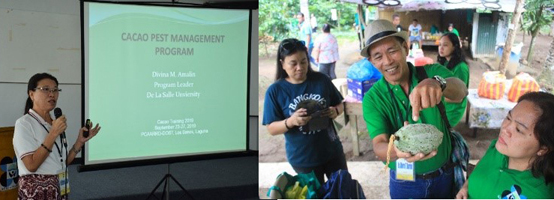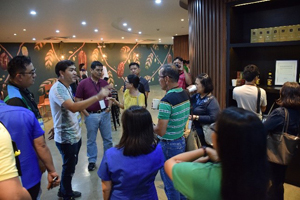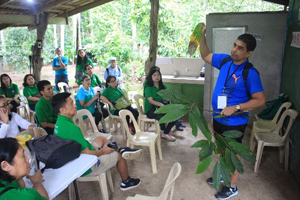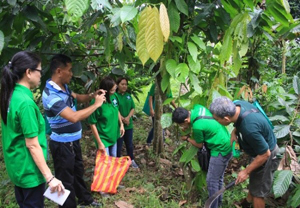 Cacao is considered a high value crop in the Philippines and together with this status, there is a growing interest and an increasing demand for cacao products. However, climate change along with insect pests and diseases on cacao significantly limit cacao production and cause significant loss in yield.
Cacao is considered a high value crop in the Philippines and together with this status, there is a growing interest and an increasing demand for cacao products. However, climate change along with insect pests and diseases on cacao significantly limit cacao production and cause significant loss in yield.
 To address this problem, the Forestry and Environment Research Division (FERD) of the Philippine Council for Agriculture, Aquatic and Natural Resources Research and Development of the Department of Science and Technology (DOST-PCAARRD) conducted a five-day training workshop titled, “Strengthening Sustainable Cacao Farming System in the Philippines in Response to Climate Change.”
To address this problem, the Forestry and Environment Research Division (FERD) of the Philippine Council for Agriculture, Aquatic and Natural Resources Research and Development of the Department of Science and Technology (DOST-PCAARRD) conducted a five-day training workshop titled, “Strengthening Sustainable Cacao Farming System in the Philippines in Response to Climate Change.”
The training aims to equip participants with knowledge on climate change, its potential effect on cacao production, and climate change mitigation using biological and ecological approaches. Moreover, it also seeks to further develop the cacao industry through science-based solutions and innovations
 Dr. Divina Amalin, professor and head of the Biological Control Research Unit of De La Salle University (DLSU-BCRU), served as the overall facilitator of the training workshop. Her team gave lectures and hands-on training on cacao production, processing, marketing, pest management, rehabilitation, and other topics.
Dr. Divina Amalin, professor and head of the Biological Control Research Unit of De La Salle University (DLSU-BCRU), served as the overall facilitator of the training workshop. Her team gave lectures and hands-on training on cacao production, processing, marketing, pest management, rehabilitation, and other topics.
The participants also visited Auro Chocolate, a local chocolate factory in Calamba, Laguna. Facilitated by the factory’s operations manager, Mr. Luisito Cena, the participants observed how cacao beans are sorted, weighed, and roasted before processing into different chocolate products.
The trainees also visited Ino’s Farm in Liliw, Laguna, where they were given hands-on training on pruning, analyzing soil samples, and identification of beneficial and harmful insects. They were also able to identify cacao trees infected with vascular streak disease (VSD) and black pod rot (BPR).
 According to Paulino Sulibit, owner of Ino’s Farm, the training workshop was beneficial to his farm because from it, he obtained new knowledge on identifying, preventing, and controlling cacao insect pests and diseases.
According to Paulino Sulibit, owner of Ino’s Farm, the training workshop was beneficial to his farm because from it, he obtained new knowledge on identifying, preventing, and controlling cacao insect pests and diseases.
Moreover, DLSU will closely coordinate with Sulibit to further monitor and assess the infected trees tagged in his farm.
DOST-PCAARRD considers cacao as one of the priority crops under its Industry Strategic Science and Technology Programs (ISPs).
